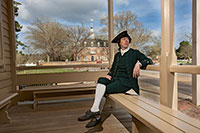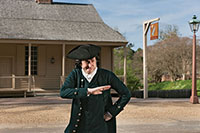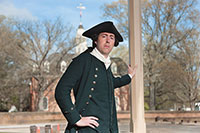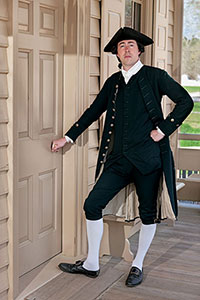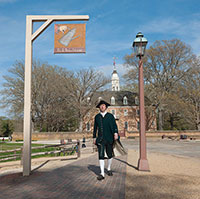
Dave Doody
Not all colonists—British citizens, after all—supported the War for Independence. Williamsburg’s William Hunter was one who did not.
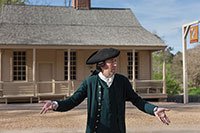
Dave Doody
Like others during the Revolution, William Hunter, portrayed by Sam Miller, struggled with the divisions his loyalist views caused with friends and family who backed independence. Finally, in 1781, he joined Cornwallis’s British army at Yorktown.
Peopling the Past: Meet William Hunter
by Ed Crews
Not every Virginian supported the fight for independence and the Revolutionary War. Williamsburg printer William Hunter believed the American cause was unwise and its defeat inevitable. Sam Miller, portraying Hunter, speaks as Hunter might have in September 1779, presenting a pessimistic view of the conflict and its consequences. Miller’s comments have been edited and condensed.
- Mr. Hunter, you seem upset. What’s bothering you?
Any rational man should be upset, sir. The British have invaded Virginia. Fifteen hun- dred regulars have seized the fort at Portsmouth, and the Virginia regiment has fled to North Carolina. The Continental Army is not here. George Washington is in the North. Nobody stands between us and disaster. The English easily could march on Williamsburg and burn the town. Governor Patrick Henry, whom I have never held in high regard, has talked about calling out the militia. What can farmers and merchants do to stop well-trained troops? We are in a dangerous and, to my mind, helpless position.
- You see no reason for hope?
I believed from the war’s start that disaster would attend the foolhardy pursuit of Congress’s dream of independence. The British army is unstoppable, and the royal navy is the world’s best. Great Britain has occupied one-fifth of the known world. I never thought that the Continental Army could oppose this sort of force. Defeat seemed, to me, inevitable from the start, and, now, with English soldiers in Portsmouth, I have the worst possible confirmation of my fears.
- How deep are your doubts about the American cause?
To my way of thinking, Congress had no right to meet in the first place, and its members were all-too eager to vote for independence. As to the Declaration of Independence, it is little more than a collection of opinions with no real legal or moral force behind it. Plus, Congress is completely ineffectual at supporting the war. The representatives debate a lot, but they cannot seem to get Washington the men, food, or equipment he so desperately needs.
- Could Congress have followed another course?
Certainly. We could have peacefully protested those British policies we opposed. This worked for the Stamp Act and the Townsend Act. I considered both unreasonable and supported dignified objections. In time, our opposition became clear, and both measures were repealed. The tea tax? We could have chosen simply not to drink tea, and the tax quickly would have disappeared. Hotheads in Boston only made the matter worse by their violent and illegal destruction of property. All would have been well if people acted calmly and rationally.
- Your comments suggest that you are a loyalist.
My political convictions are my own business. I will say that I have grown weary of the American cause and the ineptitude of its leaders. Their bullheadedness astonishes me, especially in the face of the overwhelming odds against them and that their plans are in shambles.
- Do others share your views?
I believe there are many more people who think like me than is generally believed. When the British occupied New York, a number of people expressed their true beliefs about the war and their loyalty to the crown. Once the fear of speaking honestly about Congress and this conflict is removed, people who have doubts can and do state them.
- Can you share your views openly with Williamsburg neighbors?
I cannot. I wish that I could, like a proper Englishman with rights given us by custom and law, openly debate the current situation. Yet that is impossible. We live in the shadow of being tarred and feathered for giving a view that is contrary to that held by Congress. My situation is especially difficult because my father-in-law is fully behind the independence movement, and I naturally want to keep the peace with friends and family.
- I wonder if you ever would go over to the British.
I would not want my neighbors to hear this, so I ask your confidence. I believe that if the British come here—and they very well may—we would rather be under their protection than at the mercy of their bayonets.
Hunter acted on his disillusionment with the American cause. In 1781, when Lord Cornwallis came to Williamsburg, he joined the British army, served in it at the Battle of Yorktown, and immigrated to England after the war.
—INTERVIEW CONDUCTED, CONDENSED, AND EDITED BY ED CREWS

